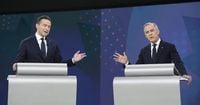In a heated debate that encapsulated the divergent visions for Canada’s future, Liberal Leader Mark Carney and Conservative Leader Pierre Poilievre faced off in Montreal on April 17, 2025, as the federal election approaches. The debate highlighted stark contrasts in their perspectives on national security, economic policy, and the looming influence of the United States.
Thirty-seven years ago, John Turner warned Brian Mulroney that a free-trade deal with the United States would lead to a loss of Canada’s political independence. Turner’s cautionary words resonate today as Carney and Poilievre grapple with the implications of a changing geopolitical landscape. In a modern twist, Carney framed Donald Trump as the primary crisis facing Canada, arguing that Trump’s policies threaten to fundamentally alter the world economy and undermine Canadian sovereignty.
During the debate, Carney asserted, “We are facing the biggest crisis of our lifetimes. Donald Trump is trying to fundamentally change the world economy, the trading system, but really what he's trying to do to Canada — he's trying to break us, so the U.S. can own us.” His comments reflect a broader concern among analysts and pollsters who note that fear of Trump has buoyed the ruling Liberal party, pushing its support above 40% as it aims for a potential majority in the House of Commons.
In contrast, Poilievre positioned himself as the harbinger of change, criticizing the Liberal government’s record over the past decade. He stated, “Many of you are worried about paying your bills, feeding your families, even owning a home. You're worried your kids are in danger. But I'm here to say it doesn't have to be this way.” His campaign hinges on the promise of a fresh direction for Canada, one that he argues has been stifled by the Liberal agenda.
Poilievre’s rhetoric emphasized the need for a shift away from what he described as a “lost Liberal decade.” He challenged viewers, asking, “Are you prepared to elect the same Liberal MPs, the same Liberal ministers, the same Liberal staffers all over again for a fourth term?” This appeal to voters’ frustrations with the current administration is a cornerstone of his campaign strategy.
As the debate unfolded, both leaders were pressed on the biggest security threats facing Canada. Carney identified China as the most significant concern, stating, “I think the biggest security threat to Canada is China.” This assertion underscores a growing recognition among political leaders that global dynamics are shifting, and Canada must navigate these changes carefully.
Poilievre, on the other hand, pointed to rampant crime as the primary threat, reflecting a focus on domestic issues that resonate with many Canadians. The debate also touched on the recent resignation of Justin Trudeau, which has revitalized the Liberal party’s fortunes after a period of declining support. Carney, attempting to distance himself from Trudeau’s legacy, declared, “I’m a very different person from Justin Trudeau.”
In a flash poll conducted by Abacus Data immediately following the debate, viewers rated the performances of the candidates. Among those who watched, 43% felt Poilievre performed best, while 40% gave the nod to Carney. However, a notable 29% believed Poilievre had the weakest outing. The poll also revealed that 59% of viewers left with a positive impression of Carney’s performance, compared to 53% for Poilievre.
As the election date approaches on April 28, 2025, both candidates must navigate the complex political landscape shaped by their differing narratives. Carney aims to maintain the momentum gained from the debate, while Poilievre seeks to reignite the “time for a change” sentiment that has waned since Trudeau’s departure.
Throughout the debate, the leaders tackled a range of pressing issues, including the economy, housing, and international relations. Carney stressed the need for a fundamentally different approach to housing, advocating for increased supply to address affordability concerns. Poilievre countered, blaming the Liberal government for soaring housing costs, asserting that “housing costs have doubled during the lost Liberal decade.”
On the topic of foreign policy, Carney emphasized the importance of diversifying Canada’s trading partners, stating, “The starting point has to be one of strength.” He argued that Canada must work with like-minded countries to navigate the challenges posed by the U.S. and other global powers.
As the debate concluded, the leaders reflected on their campaigns. Blanchet, leader of the Bloc Québécois, suggested that the leaders should have started sooner to create an environment for a partnership to face Trump. Singh, leader of the NDP, expressed regret about not meeting more voters during the campaign.
The debate showcased the urgency of the issues at hand and the differing visions for Canada’s future. As families gather for discussions during the upcoming holiday, the political landscape will likely be a hot topic, influencing voter sentiment as the election nears.
In the end, the clash between Carney and Poilievre is more than just a political contest; it's a reflection of the broader societal anxieties and aspirations that define Canada today. With a mere ten days until the election, the stakes have never been higher, and the path forward remains uncertain.





